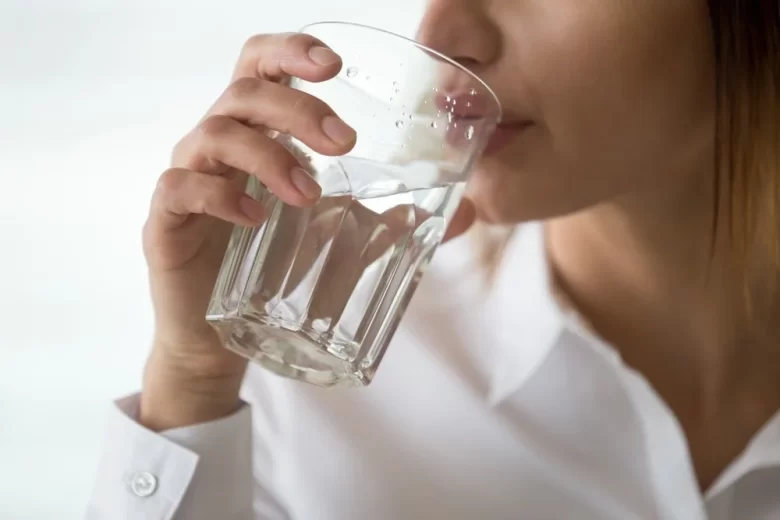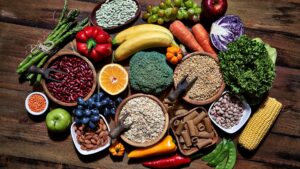Drinking enough fluids each day to meet individual needs, including plain or flavored coffee/tea, milk, and other low-cal beverages such as water, is key in order to avoid becoming dehydrated. According to the National Institutes of Health (NIH), you should aim to drink an appropriate amount of fluids. Water is often recommended as the source of this hydration. People who engage in vigorous exercise need to consume additional fluids due to sweat loss; those at higher elevations also must consume additional hydration.
1. It Keeps You Hydrated
Your body does not store water, so it requires fresh supplies daily to survive. Women and men should ingest approximately 2 liters (8 cups) of fluids each day to remain hydrated. Drink water before feeling thirsty and continue sipping throughout the day, preferring plain water, which contains no extra calories or sugars. Fruit and vegetable juices, herbal teas, and broth can all contribute to an effective hydration plan.
Avoid dehydrating drinks such as coffee, sugary sodas, beer, and wine that deplete your fluid stores, such as caffeine. Plus keep in mind that many fruits and vegetables (watermelons, cucumbers, and kale are all 96%) contain high concentrations of water – you could also try an app to track your daily water consumption!
2. It Helps You Burn Fat
While exercising, water is the main fluid lost through sweat. Replacing it helps improve performance and speed weight loss efforts. Dehydration can be a serious threat for babies and children. Vomiting and diarrhea cause rapid dehydration due to loss of electrolytes and water.
Water is an ideal beverage choice to stay hydrated, though other low-cal drinks like unsweetened tea, coffee, and fruit juices also can provide essential hydration benefits while being healthier alternatives to sugary beverages. Keep in mind that any beverage containing water or healthy liquids counts toward your daily water consumption, although caffeinated drinks should be avoided because they may cause you to urinate more frequently and lead to dehydration.
3. It Keeps Your Brain Healthy
We have all heard the recommendation to drink eight glasses of water daily, but it is crucial for each individual to find their ideal level and routine of hydration. Staying hydrated regularly can help improve mental clarity, memory, and mood. Your brain needs water in order to function optimally. Even mild dehydration can reduce short-term memory and concentration and affect your mood adversely.
Proper hydration plays an essential role in your body’s natural detoxification processes, which eliminate waste and harmful substances through urination, breathing, perspiration, and bowel movements. Sufficient hydration may also help reduce headaches for those prone to them, while staying hydrated may help avoid migraine attacks altogether. Incorporating water regularly into your daily regimen may help enhance your mood stability, improve focus and concentration, and help provide restful night’s slumber.
4. It Keeps Your Joints Healthy
Dehydration could be to blame if your joints feel stiff and painful. Dehydration depletes our bodies of synovial fluid, leaving our cartilage dry and stiff due to reduced synovial fluid production in our joints. Furthermore, dehydration throws off electrolyte balances and weakens muscles, increasing their susceptibility to cramps.
As part of your daily life and to avoid long-term joint issues and discomfort, making water drinking and including hydrating foods part of your routine should become second nature for you. Doing this will reduce chances of missing your daily goal for daily water intake as well as create long-term benefit to joint health.
5. It Helps Prevent Kidney Stones
Kidney stones are painful clumps of mineral crystals that form in the urinary tract. Drinking enough water can help people at risk for kidney stones – including those who have a family history, live in hot climates, or sweat heavily while exercising – prevent these painful conditions from forming in their urinary tracts.
Increased fluid intake increases urine flow through your kidneys, diluting any potential concentration of minerals that could form kidney stones. You can further decrease your chances of kidney stones by eating foods high in calcium such as low-fat dairy products, certain fruits and vegetables (radishes, celery sticks, spinach, broccoli, watermelons, or tomatoes), and low-fat dairy.
6. It Helps Prevent Heart Disease
A healthy diet that includes plenty of water and other fluids is key in protecting against heart disease. Dehydration occurs when more fluid is lost through sweating, illness, urination, and high altitudes than is consumed, leading to heart strain and increasing blood pressure.
Studies have demonstrated that staying hydrated is one way to help lower your risk of heart failure, an increasingly prevalent cardiac condition, over time. According to an article published in 2022 in the European Heart Journal, dehydration requires your body to work harder at pumping blood due to thickened and constricted vessel walls; this increases blood pressure as it thickens further, potentially leading to high blood pressure or palpitations episodes. Staying well hydrated also lowers sodium levels, which is beneficial for heart health.
7. It Helps You Lose Weight
Drink plenty of water throughout the day, especially when exercising or in hot weather, to prevent muscle fatigue, cramping, and heat exhaustion. A glass of water before meals may also help suppress your appetite.
Staying hydrated can also aid with weight loss by aiding in eliminating waste as urine and feces from your system and replacing high-calorie drinks such as soda, fruit juice, and sweetened tea/coffee with water instead. Aim to drink 8 glasses daily, but more might be beneficial depending on individual health needs such as overactive bladder and low blood pressure issues; increasing water consumption also could enhance exercise effectiveness while decreasing kidney stone risk.
8. It Helps You Feel Better
Dehydration can leave you feeling fatigued, headachey, and constipated; keeping up with recommended daily water consumption can improve these symptoms and help improve mental and physical wellbeing. Though overhydrating is relatively rare, exercise and extreme heat may increase its likelihood. Drinks containing sodium and potassium may help mitigate this risk.
As far as drinking water goes, it is best to follow your body’s natural indicators, such as thirst, energy levels, and urine color, to monitor hydration. Also keep in mind that water-rich foods such as fruit, vegetables, and soup count toward meeting hydration requirements as well.




